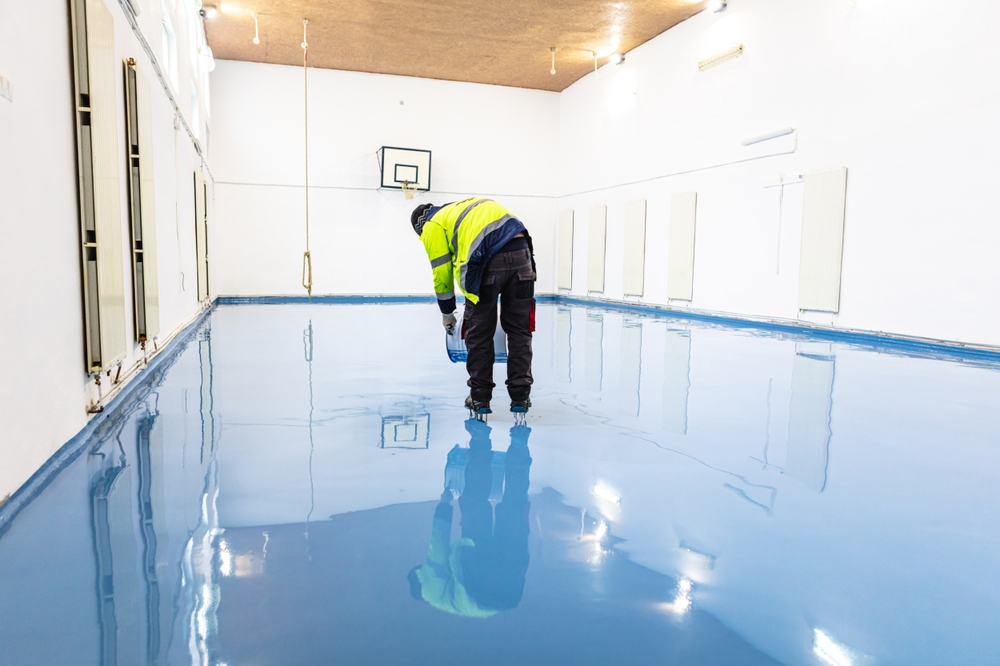Epoxy Floor Coating | Epoxy Flooring
26-August-24
Epoxy Floor Coating: The Ultimate Guide to Durable and Attractive Flooring
Epoxy floor coating is rapidly gaining popularity across various industries and residential spaces due to its durability, aesthetic appeal, and versatility. Whether you’re looking to upgrade your garage, industrial space, or commercial building, epoxy flooring offers a robust solution that combines functionality with style.
What is Epoxy Floor Coating?
Epoxy floor coating is a type of flooring solution made from a two-part mixture of epoxy resin and hardener. When these components are combined, they create a chemical reaction that forms a rigid, plastic-like material. This material bonds exceptionally well to concrete surfaces, creating a smooth, durable, and high-gloss finish that is resistant to wear, chemicals, and moisture.
Benefits of Epoxy Floor Coating
- Durability: Epoxy floors are known for their incredible strength and resistance to heavy traffic, making them ideal for commercial and industrial environments. They can withstand heavy machinery, vehicles, and high foot traffic without showing signs of wear and tear.
- Chemical Resistance: Epoxy coatings are highly resistant to a variety of chemicals, including oils, acids, and solvents. This makes them an excellent choice for warehouses, factories, and garages where spills are common.
- Ease of Maintenance: The smooth, non-porous surface of epoxy flooring makes it easy to clean and maintain. Dust, dirt, and liquids can be quickly wiped away, making it a low-maintenance flooring option.
- Aesthetic Appeal: Available in a wide range of colors and finishes, including metallic and flake options, epoxy floors can be customized to fit the design aesthetic of any space. The high-gloss finish also adds a polished, professional look.
- Safety: Epoxy coatings can be formulated with anti-slip additives, enhancing safety in areas prone to spills or moisture. This is particularly beneficial in industrial settings where employee safety is a priority.
- Cost-Effective: While the initial cost of epoxy floor coating can be higher than other options, its long-term durability and low maintenance costs make it a cost-effective solution over time.
Types of Epoxy Floor Coating
- Self-Leveling Epoxy: Ideal for new or old concrete floors, this type of epoxy provides a smooth and level surface that is both durable and aesthetically pleasing. It’s commonly used in commercial spaces, garages, and industrial settings.
- Epoxy Flake Coatings: This decorative option involves adding colored flakes or chips to the epoxy mixture. The result is a textured finish that hides imperfections and provides an attractive, slip-resistant surface.
- Metallic Epoxy Coatings: Metallic epoxy floors offer a unique, reflective surface with a three-dimensional look. The metallic pigments create a swirling effect, making each floor a work of art.
- Graveled Epoxy: Known for its durability, graveled epoxy is often used in industrial and commercial settings. It provides a highly textured surface that is ideal for high-traffic areas.
- Anti-Static Epoxy: Used in environments where static-sensitive equipment is present, such as hospitals and labs, anti-static epoxy prevents the buildup of static electricity.
Epoxy Floor Coating Applications
- Residential Spaces: Epoxy is commonly used in garages, basements, and kitchens due to its durability and easy maintenance. It’s also gaining popularity in living spaces for its sleek, modern look.
- Commercial and Industrial Facilities: Warehouses, factories, showrooms, and retail spaces benefit from epoxy flooring due to its strength, resistance to damage, and ease of cleaning.
- Healthcare Facilities: Hospitals and clinics use epoxy flooring for its hygienic properties, chemical resistance, and ease of cleaning.
- Educational Institutions: Schools and universities often choose epoxy for its durability and the ability to customize colors and patterns to match school branding.
Installation Process
The installation of epoxy flooring involves several steps:
- Surface Preparation: The concrete surface must be clean, dry, and free of any cracks or imperfections. This may involve grinding or shot-blasting the floor to ensure proper adhesion.
- Primer Application: A primer is applied to the concrete surface to promote adhesion between the floor and the epoxy coating.
- Epoxy Application: The epoxy mixture is spread evenly across the floor, either manually or with specialized tools. Multiple layers may be applied depending on the desired thickness and finish.
- Curing: The epoxy must cure for a specified period, typically 24-72 hours, to achieve full hardness and durability.
- Optional Finishes: Additional layers of epoxy, including topcoats with anti-slip additives or decorative elements like flakes, may be applied to enhance the floor’s appearance and functionality.
Maintenance and Longevity
Epoxy floors are known for their low maintenance requirements. Regular sweeping and occasional mopping with a mild detergent are usually sufficient to keep the floor looking pristine. Avoid using harsh chemicals or abrasive cleaning tools that could damage the surface.
With proper care, epoxy floors can last 10-20 years or more, making them a long-term investment for any space.
Conclusion
Epoxy floor coating is a versatile and durable solution for a wide range of applications. Its combination of strength, aesthetic appeal, and low maintenance makes it an ideal choice for both residential and commercial spaces. Whether you’re looking to protect your garage floor, enhance your industrial facility, or create a stunning showroom, epoxy flooring offers a reliable and attractive option that stands the test of time.
Investing in epoxy flooring not only improves the appearance of your space but also adds value by providing a long-lasting, resilient surface that can withstand the demands of daily use.

 Innov Touch Technologies Pvt Ltd.
Innov Touch Technologies Pvt Ltd.